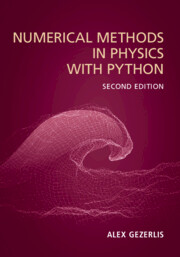3 - Derivatives
Published online by Cambridge University Press: 30 August 2023
Summary
Chapter 3 starts out with a physics motivation, as well as a mathematical statement of the problem that will be tackled in later sections. After a brief discussion of analytical differentiation, the bulk of the chapter is devoted to increasingly better finite-difference approximations, like the forward difference and the central difference. These are explicitly derived using Taylor expansions, and also applied to second derivatives and to points on a grid. A section introduces the useful tool of Richardson extrapolation, which reappears in later chapters. The chapter also includes an original discussion of automatic differentiation, which is built up from the concept of dual numbers. The chapter is rounded out by a physics project, which studies the kinetic energy in single-particle quantum mechanics, and a problem set. The physics project involves different wave functions and provides the groundwork for the project in the integrals chapter.
Keywords
Information
- Type
- Chapter
- Information
- Numerical Methods in Physics with Python , pp. 89 - 125Publisher: Cambridge University PressPrint publication year: 2023
